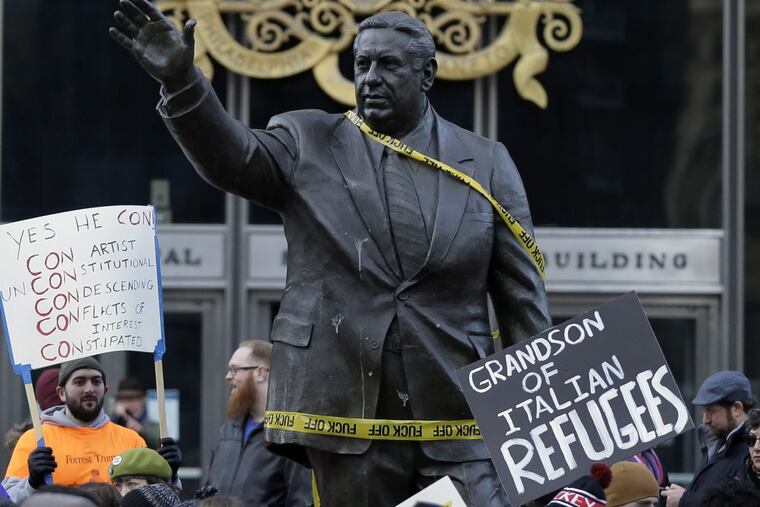Tear down the Frank Rizzo statue now | Opinion
With the events in Charlottesville, Philadelphians are starting to sound the battle cry against the Rizzo statue once again.

Over the weekend, Charlottesville, Va., saw the largest public gathering of white nationalists in at least 10 years. The ostensible motivation for their march was to protest the recent decision to remove from a public park the statue of Confederate Gen. Robert E. Lee — a decision in line with other Southern states that have endeavored to chip away at the public luster attached to the racist pro-slavery Confederate agenda.
Taking the Confederate stars and bars off a state flag or taking down a Confederate statue is important for several reasons: It tells the African American citizens who live in the shadow of such flags and statues that their present-day government values them more highly than it does the memory of those who once tried to enslave them. It also acknowledges the fact that such Confederate symbols have been adopted by new generations to represent pro-white points of view.
In Philadelphia, we don't have much Confederate history to boast — notwithstanding the Confederate flags I've seen fluttering from multiple homes in Bridesburg. But we do have at least one public statue that represents bigotry and racism — the statue of Frank Rizzo — and it resides in a place of honor in front of the Municipal Services Building.
Like most politicians, Rizzo, a former police commissioner and mayor, has his share of fans. He had a lot of qualities that Philadelphians liked. He came from an immigrant family and grew up in a rowhouse in Philly, a product of the neighborhoods. He went from being a beat cop to leading one of the nation's largest cities, which is about as unpretentious a trajectory one can take. He was a straight talker who never put on airs. You always knew exactly what Frank Rizzo was thinking.
But Frank Rizzo was a bigot and a racist, and he implemented policy and procedure based on his prejudices. In the late 1960s, as police commissioner, his hatred of gays and lesbians led to years of harassment of the LGBT community — raids on LGBT-associated coffee shops and clubs, violent Saturday night roundups of suspected gay people that resulted in spurious arrests that never saw charges. His militarized police force terrorized that community and forced many queer people in Philadelphia to live in fear or to hide their identity entirely.
His hostility toward African Americans was equally well-known. Along with his casual use of the N-word to describe the citizens he was meant to protect, his police force was known for targeting black residents and black bodies, beating suspects in custody with impunity, siccing angry dogs on black student protesters, forcing Black Panther activists to stand naked on the street in a mass arrest. He turned the police force into a weapon against black communities, endorsing racial profiling and stop-and-frisk. As he had with the gay community, Rizzo brought years of terror to an entire swath of Philadelphia residents. When he died in 1991, the obituary in the New York Times noted: "Mr. Rizzo was one of those seemingly larger-than-life figures, destined to be hero to some and villain to others." He was a hero to white Philadelphians, and remains so. To anyone of a different color, or who did not conform to bourgeois expectations, he was a threatening and dangerous villain.
Yet, his bronze likeness has a place of prominence in Center City, on municipal land. There has been opposition to the placement of this likeness since it was erected in 1998. Almost one year ago exactly, in fact, Black Lives Matter activist Erica Mines created a campaign to have the Frank Rizzo statue removed. "Frank Rizzo's racist relationship toward Philadelphia's African American community has always been one of violence, devastation, and despair," she wrote in her petition. Other activists took up the cause, but although their efforts drew some attention in the local press, the statue remains, a reminder of the way power can be corrupted to oppress and instill fear.
Now, with Charlottesville and the toppling of another Confederate statue in North Carolina on Tuesday, Philadelphians are starting to sound the battle cry once again against the Rizzo statue.
It is, without question, time for Philadelphia to make this change. There are Philadelphians who still bear the physical and emotional scars of Rizzo's reign. To have the statue where it is suggests their pain doesn't count and implicitly endorses Rizzo's racist, homophobic agenda and legacy of police brutality. Is this the kind of man we want to honor in our public squares?
Philadelphia is a sanctuary city. We have a mayor who, as a councilman, was an LGBT advocate. As mayor, he has quickly and unequivocally expressed his opposition to bigotry and hate. We have a beautifully diverse populace that engages in peaceful activism with the support of a police department that believes in our right to protest. The Frank Rizzo statue does not represent Philadelphia in 2017. It should go.
Liz Spikol, a lifelong Philadelphian, is a writer and editor who lives in Mount Airy. You can reach her at @lspikol on Twitter or at lspikol@gmail.com.